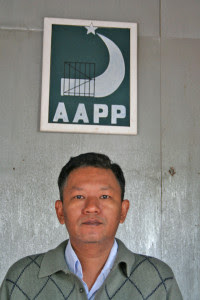Despite the much-lauded government reforms by the international community and President U Thein Sein’s 2013 promise to release all political prisoners, Burma’s military backed government is still clamping down on voices critical of the government, including political activists and journalists.
 The Assistance Association for Political Prisoners in Burma stated that dozens of political prisoners were currently detained in Burma, with a further 85 awaiting charges.
The Assistance Association for Political Prisoners in Burma stated that dozens of political prisoners were currently detained in Burma, with a further 85 awaiting charges.
“AAPP currently recognizes at least 59 political prisoners detained across Burma,” AAPP said in an official statement, “The dangers to journalists, farmers, demonstrators, and political activists are as real as ever—a fact reflected in the number of arrests made since the start of the year.”
AAPP condemned Burma’s government for failing to release all political prisoners and for the President to keep to his promise to do so.
“President U Thein Sein promised to release all political activists by the end of 2013, a commitment he made, not only to his own country, but to the international community. AAPP has recorded evidence that this promise was not fulfilled,” AAPP said, referring to a promise made on July 15 when President Thein Sein met with the British Prime Minister in London and stated that all “prisoners of conscience” would be released by 2014.
In an interview with Karen News, Ko Bo Kyi, Secretary of the AAPP, urged the government to get rid of the contentious Unlawful Association Act.
“The ongoing arrest of political activists in Burma undermines trust in the current government. The government must abolish protest laws which are used to arrest these people.”
Ko Bo Kyi maintained that Burma’s government lacked legitimacy while it continued to repress political opponents.
“In fact the government is not legitimate when it arrests its own people for protesting, refuses to amend the constitution in line with democratic principles, and prosecutes civil war in ethnic areas,” he said, adding, “The president did not keep his promise – how can people trust this government if it does not keep its promises?”
Human rights groups have warned that Burma’s draconian protest laws, that require all demonstrations to be signed off by the authorities, are being used to stifle activists and political dissent.
AAPP said it is concerned that critical voices in Burma’s burgeoning independent media were under attack.
“Press freedoms in 2014 have been repeatedly threatened, with the arrest of numerous journalists and press staff members around the country, demonstrating the plight of those fighting for freedom of speech, assembly, and expression.”
A recent spate of journalist arrests in the country was cited by AAPP, including Zaw Pe, a video journalist from Democratic Voice of Burma who was sentenced to one year in prison for ‘disturbing a civil servant,’ and five Unity Weekly staff members who were jailed following the publication of a story in that paper alleging Burma has a chemical weapons facility.
“This attitude of oppressing journalists and restricting press freedoms is evidently still prevalent in Burma, with the press hamstrung in their attempts to question the actions of government and state officials. While journalists are prevented from providing the people of Burma with information regarding the activities of their government, freedom of speech can never truly exist,” AAPP warned.



